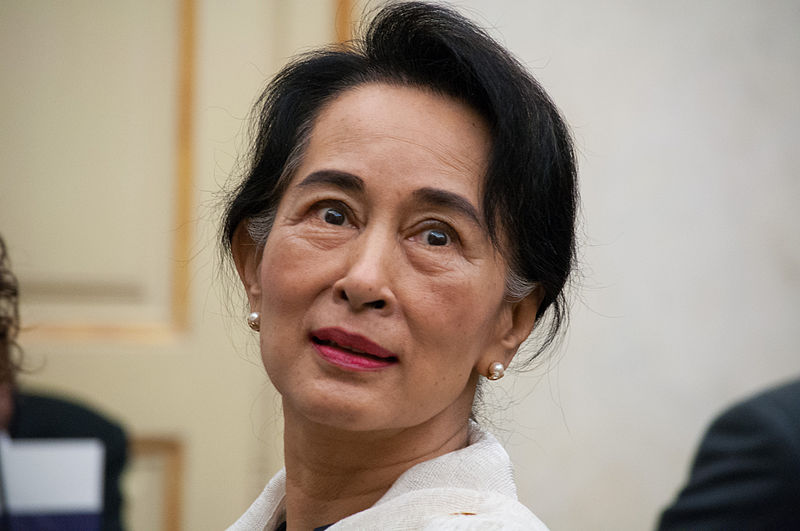Aung San Suu Kyi: Lessons in Leadership and Resilience

Discover the Leadership Legacy of Aung San Suu Kyi
Aung San Suu Kyi, a Nobel Peace Prize laureate, and the daughter of the founder of modern-day Myanmar, is a celebrated figure in the world of politics and leadership. Her unwavering commitment to democracy, human rights, and peaceful resolution of conflicts has earned her the admiration of people all over the world.
Born in Rangoon (now Yangon) in 1945, Aung San Suu Kyi was exposed to politics and leadership from an early age. Her father, Aung San, was a nationalist leader who fought for Myanmar’s independence from British colonial rule. However, his assassination in 1947, just a few months before independence, left Aung San Suu Kyi without a father figure for most of her life.
Despite this, Aung San Suu Kyi was determined to continue her father’s legacy of fighting for Myanmar’s democracy and human rights. She received her education in Myanmar and later in the United Kingdom, where she studied philosophy, politics, and economics at St. Hugh’s College, Oxford.
After completing her studies, Aung San Suu Kyi worked for the United Nations in various capacities before returning to Myanmar in 1988. The country was going through a period of political unrest, and Aung San Suu Kyi found herself at the forefront of the pro-democracy movement. She founded the National League for Democracy (NLD), which became the largest opposition party in Myanmar.
In 1990, the NLD won a landslide victory in the country’s first free elections in 30 years, but the military junta that ruled the country at the time refused to honor the results. Aung San Suu Kyi was placed under house arrest, where she remained for a total of 15 years, from 1989 to 2010, with brief periods of release.
Despite her prolonged detention, Aung San Suu Kyi continued to be a symbol of hope and inspiration for the people of Myanmar and the international community. Her courage and resilience in the face of adversity earned her numerous awards and recognitions, including the Nobel Peace Prize in 1991.
Aung San Suu Kyi’s leadership lessons and stories are a testament to the power of perseverance, empathy, and determination in the face of immense challenges. Her unwavering commitment to democracy, human rights, and non-violent resolution of conflicts has inspired generations of leaders around the world. This article will delve into Aung San Suu Kyi’s leadership lessons and explore how her experiences can inform and inspire leaders in all fields.
Aung San Suu Kyi’s Early Life
Aung San Suu Kyi’s early life was shaped by her family background and her father’s legacy as a national hero. Her father, Aung San, was a founding member of the Anti-Fascist People’s Freedom League and played a pivotal role in securing Myanmar’s independence from British colonial rule in 1948. Aung San’s assassination, however, left Aung San Suu Kyi without a father figure for most of her life, and her mother, Khin Kyi, a diplomat and politician, became her role model and mentor.
Growing up, Aung San Suu Kyi was exposed to politics and leadership from an early age. She attended prominent schools in Myanmar and was educated in the English language. Her mother instilled in her a deep sense of compassion and empathy for others, which would later become central tenets of her leadership style.
In 1960, Aung San Suu Kyi left Myanmar to pursue her education abroad. She studied politics, philosophy, and economics at St. Hugh’s College, Oxford, and later earned a degree in economics from the School of Oriental and African Studies, University of London. During her time in the UK, Aung San Suu Kyi was exposed to democratic ideals and became involved in political activism, participating in protests against the military coup in Myanmar in 1962.
Aung San Suu Kyi’s early career was focused on her family life and her work with the United Nations. In 1972, she married Michael Aris, a British academic, and had two children, Alexander and Kim. Her work with the United Nations began in 1969, and she held various positions in New York and Bangkok, including as an assistant secretary in the Department of Political Science.
Throughout her life, Aung San Suu Kyi’s commitment to her father’s vision of a democratic and prosperous Myanmar never wavered. Her upbringing, education, and early career experiences laid the foundation for her later leadership roles and informed her leadership style. Her deep sense of empathy and compassion, coupled with her dedication to democracy and human rights, would prove to be crucial in her later political career, where she would face immense challenges and opposition.
Aung San Suu Kyi’s Political Career
Aung San Suu Kyi’s entry into politics was spurred by the pro-democracy movement in Myanmar in 1988. The country was in the midst of political turmoil, with mass demonstrations calling for democracy and human rights. Aung San Suu Kyi, who had returned to Myanmar to care for her ailing mother, found herself at the forefront of the movement.
In September 1988, Aung San Suu Kyi addressed a crowd of over half a million people in Yangon, the country’s largest city, and called for a democratic revolution. She founded the National League for Democracy (NLD) and became its general secretary, with the goal of bringing democracy to Myanmar.
In the 1990 general elections, the NLD won a landslide victory, with Aung San Suu Kyi as its leader. However, the military junta that ruled the country at the time refused to recognize the election results and placed Aung San Suu Kyi under house arrest. She would remain under house arrest for a total of 15 years, with brief periods of release.
During her time under house arrest, Aung San Suu Kyi continued to be a powerful symbol of democracy and human rights, both in Myanmar and around the world. She received numerous awards and recognitions, including the Nobel Peace Prize in 1991, which was awarded in recognition of her non-violent struggle for democracy and human rights.
In 2010, Aung San Suu Kyi was released from house arrest and began to play an active role in Myanmar’s political scene once again. She led the NLD to victory in the 2015 general elections, which were deemed free and fair by international observers. Aung San Suu Kyi became the country’s de facto leader, serving as state counselor and foreign minister.
Despite her significant achievements and contributions to democracy and human rights, Aung San Suu Kyi’s leadership has been marred by controversy, particularly in relation to the Rohingya crisis. The Rohingya, a Muslim minority group in Myanmar, have been subjected to violence and persecution, leading to a refugee crisis in neighboring Bangladesh. Aung San Suu Kyi’s response to the crisis has been criticized by the international community, with many accusing her of failing to speak out against human rights abuses.
Aung San Suu Kyi’s political career is a testament to her unwavering commitment to democracy, human rights, and peaceful resolution of conflicts. Her experiences under house arrest and in leadership roles have shaped her leadership style and informed her values and priorities. Despite facing immense challenges and opposition, Aung San Suu Kyi has remained dedicated to her vision of a democratic and prosperous Myanmar.
Leadership Lessons from Aung San Suu Kyi
Aung San Suu Kyi’s leadership lessons and stories are a source of inspiration and guidance for leaders in all fields. Her experiences, both in her personal life and in her political career, have shaped her leadership style and values, and offer valuable insights into what it takes to lead with resilience, empathy, and determination.
-
Resilience and courage in the face of adversity: Aung San Suu Kyi’s unwavering commitment to democracy and human rights is a testament to her resilience and courage. Despite being placed under house arrest for 15 years, she continued to speak out against the military junta and inspire others to join her in the fight for democracy. Her ability to endure hardship and stay true to her values is a crucial leadership lesson, as it reminds us that leadership requires resilience in the face of challenges.
-
Empathy and compassion towards others: Aung San Suu Kyi’s upbringing and personal values emphasize the importance of empathy and compassion towards others. Her deep sense of empathy allowed her to connect with people from all walks of life, and her compassion towards those who were oppressed or marginalized inspired others to follow her lead. This leadership lesson highlights the importance of understanding the needs and perspectives of others, and treating them with respect and kindness.
-
Vision and determination to achieve goals: Aung San Suu Kyi’s vision of a democratic Myanmar was the driving force behind her political career. Her determination to achieve this goal, despite facing immense opposition, inspired others to join her in the fight for democracy. This leadership lesson emphasizes the importance of having a clear vision and the determination to pursue it, even in the face of obstacles.
-
Ability to inspire and mobilize others: Aung San Suu Kyi’s ability to inspire and mobilize others was a key factor in her success as a leader. Her charisma and leadership qualities allowed her to connect with people and motivate them to take action. This leadership lesson underscores the importance of effective communication and the ability to inspire and motivate others towards a common goal.
Aung San Suu Kyi’s leadership lessons offer valuable insights into what it takes to lead with resilience, empathy, determination, and the ability to inspire and mobilize others. Her experiences under house arrest and in leadership roles have shaped her leadership style and values, and serve as a reminder that leadership requires a commitment to values, a clear vision, and the determination to pursue it, even in the face of obstacles.
Aung San Suu Kyi’s Leadership Style
Aung San Suu Kyi’s leadership style has been characterized by her commitment to democratic ideals, her ability to inspire and mobilize others, and her focus on consensus building and collaboration.
-
Democratic leadership style: Aung San Suu Kyi’s leadership style is rooted in democratic values, which prioritize inclusion, participation, and decision-making by consensus. This leadership style emphasizes the importance of listening to different perspectives, respecting diversity, and promoting open communication.
-
Consensus building and collaboration: Aung San Suu Kyi’s leadership style also emphasizes the importance of collaboration and consensus building. She has been known to prioritize working with others towards a common goal, rather than imposing her own views. This leadership lesson highlights the importance of collaboration and building relationships, and underscores the need to seek common ground and work towards shared objectives.
-
Communication skills: Aung San Suu Kyi’s leadership style is also characterized by her exceptional communication skills. She has the ability to articulate complex ideas in a simple and accessible way, and her speeches and writings have inspired people around the world. This leadership lesson highlights the importance of effective communication skills, which are essential for inspiring and motivating others, and for building relationships and promoting understanding.
Aung San Suu Kyi’s leadership style is a testament to the importance of democratic values, collaboration, and effective communication. Her ability to inspire and mobilize others, while also prioritizing consensus building and collaboration, serves as a model for leaders in all fields. In today’s rapidly changing world, where leadership requires adaptability, resilience, and the ability to inspire and mobilize others, Aung San Suu Kyi’s leadership style offers valuable insights into what it takes to lead with integrity and purpose.
Challenges Faced by Aung San Suu Kyi
Aung San Suu Kyi’s leadership has not been without challenges. Throughout her political career, she has faced significant opposition, including conflict with the military junta, house arrest and imprisonment, and criticism over her handling of the Rohingya crisis.
-
Conflict with the military junta: Aung San Suu Kyi’s opposition to the military junta that ruled Myanmar for many years made her a target for repression and persecution. She was placed under house arrest for 15 years, and her political party, the NLD, was banned from participating in elections. Her unwavering commitment to democracy and human rights, however, served as an inspiration to many and earned her international recognition and support.
-
House arrest and imprisonment: Aung San Suu Kyi’s prolonged detention, including her house arrest from 1989 to 2010, was a significant challenge to her leadership. Her ability to maintain her vision and values, despite being cut off from the outside world, is a testament to her resilience and courage.
-
Criticism over Rohingya crisis: Aung San Suu Kyi has faced criticism over her response to the Rohingya crisis, which has seen violence and persecution against the Muslim minority group in Myanmar. While she has acknowledged that the situation is complex, her response has been criticized for being inadequate and for failing to address human rights abuses.
Aung San Suu Kyi’s challenges underscore the importance of accountability and responsibility in leadership. While she has achieved significant successes in her political career, she has also faced significant criticism over her handling of certain issues. This leadership lesson highlights the importance of taking responsibility for one’s actions and decisions, and the need to acknowledge and address criticism in a constructive and respectful manner.
Furthermore, Aung San Suu Kyi’s challenges underscore the importance of avoiding blind spots and confirmation bias in leadership. Blind spots are areas where leaders may be unaware of their own biases or limitations, while confirmation bias is the tendency to seek out information that confirms one’s existing beliefs. These challenges highlight the need for leaders to be open-minded, to seek out diverse perspectives, and to challenge their own assumptions and biases.
Finally, Aung San Suu Kyi’s challenges underscore the need to balance national interests with human rights. While she has been committed to promoting democracy and human rights in Myanmar, she has also faced criticism over her response to the Rohingya crisis. This leadership lesson highlights the need for leaders to balance competing interests and priorities, and to seek solutions that promote both national interests and respect for human rights.
Aung San Suu Kyi’s challenges serve as important lessons for leaders in all fields. They highlight the importance of accountability, avoiding blind spots and confirmation bias, and balancing competing interests and priorities. Despite the challenges she has faced, Aung San Suu Kyi remains an inspiration to leaders around the world, and her leadership lessons and stories continue to offer valuable insights into what it takes to lead with integrity and purpose.
Lessons Learned from Aung San Suu Kyi’s Mistakes
Aung San Suu Kyi’s mistakes serve as important lessons for leaders in all fields. Despite her significant achievements in promoting democracy and human rights, she has also faced criticism over her handling of certain issues, particularly the Rohingya crisis. These mistakes highlight the importance of accountability, avoiding blind spots and confirmation bias, and balancing national interests with human rights.
Importance of accountability and responsibility
Aung San Suu Kyi’s response to the Rohingya crisis has been criticized for being inadequate and for failing to address human rights abuses. While she has acknowledged that the situation is complex, she has also faced criticism for not doing enough to prevent violence and persecution against the Rohingya minority group.
This leadership lesson highlights the importance of taking responsibility for one’s actions and decisions, and the need to acknowledge and address criticism in a constructive and respectful manner. Leaders must be willing to accept accountability for their mistakes and work towards making amends and finding solutions.
Avoiding blind spots and confirmation bias
Aung San Suu Kyi’s response to the Rohingya crisis has also highlighted the danger of blind spots and confirmation bias in leadership. Blind spots are areas where leaders may be unaware of their own biases or limitations, while confirmation bias is the tendency to seek out information that confirms one’s existing beliefs.
These mistakes highlight the need for leaders to be open-minded, to seek out diverse perspectives, and to challenge their own assumptions and biases. Leaders must be willing to consider alternative viewpoints and to challenge their own assumptions and beliefs, in order to make well-informed decisions and avoid the dangers of blind spots and confirmation bias.
Balancing national interests with human rights
Aung San Suu Kyi’s response to the Rohingya crisis has also highlighted the need to balance national interests with human rights. While she has been committed to promoting democracy and human rights in Myanmar, she has also faced criticism over her response to the Rohingya crisis.
This leadership lesson highlights the need for leaders to balance competing interests and priorities, and to seek solutions that promote both national interests and respect for human rights. Leaders must be willing to make difficult decisions that balance competing interests and priorities, while also ensuring that human rights are respected and protected.
Aung San Suu Kyi’s mistakes serve as important lessons for leaders in all fields. They highlight the importance of accountability, avoiding blind spots and confirmation bias, and balancing national interests with human rights. Despite her mistakes, Aung San Suu Kyi’s leadership legacy remains an inspiration to leaders around the world, and her leadership lessons and stories continue to offer valuable insights into what it takes to lead with integrity and purpose.
Aung San Suu Kyi: An Inspiration for Leaders Everywhere
Aung San Suu Kyi’s life and leadership legacy offer a wealth of lessons and stories that are relevant for leaders in all fields. Her unwavering commitment to democracy and human rights, her ability to inspire and mobilize others, and her focus on collaboration and consensus building have served as a model for leaders around the world.
However, her leadership has also been marked by significant challenges and mistakes, particularly in relation to the Rohingya crisis. These mistakes serve as important lessons for leaders, highlighting the importance of accountability, avoiding blind spots and confirmation bias, and balancing competing interests and priorities.
Despite her mistakes, Aung San Suu Kyi’s leadership legacy remains an inspiration to leaders around the world. Her commitment to democratic values, her ability to inspire and mobilize others, and her focus on collaboration and consensus building serve as a model for leaders in all fields. Furthermore, her mistakes underscore the importance of humility, openness, and a willingness to learn from mistakes and challenges.
As the world faces complex challenges and rapidly changing circumstances, Aung San Suu Kyi’s leadership lessons and stories offer valuable insights into what it takes to lead with integrity, purpose, and resilience. Her experiences and legacy serve as a reminder that leadership requires a commitment to values, a clear vision, and the determination to pursue it, even in the face of obstacles.
In conclusion, Aung San Suu Kyi’s life and leadership offer a valuable example of what it means to lead with purpose, resilience, and a commitment to democratic values and human rights. Her leadership legacy serves as an inspiration to leaders around the world, and her lessons and stories offer valuable insights into what it takes to lead with integrity and purpose in today’s rapidly changing world.






